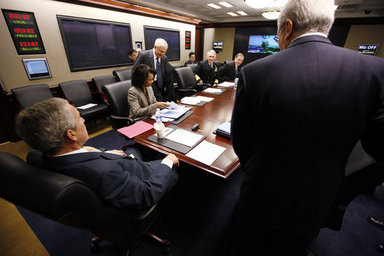
- Afghanistan
- Africa
- Budget Management
- Defense
- Economy
- Education
- Energy
- Environment
- Global Diplomacy
- Health Care
- Homeland Security
- Immigration
- International Trade
- Iraq
- Judicial Nominations
- Middle East
- National Security
- Veterans
- President's Cabinet
- USA Freedom Corps
- Faith-Based & Community Initiatives
- Office of Management and Budget
- National Security Council
- USA.gov
|
Home >
Government >
National Security Council
|


President George W. Bush is seen at a National Security Council meeting in the White House Situation Room Monday, March 24, 2008, during a video teleconference with General David Petraeus, Commander of the Multi-National Force-Iraq; and Ryan Crocker, U.S. Ambassador to Iraq. White House photo by Eric Draper
Establishment of the National Security CouncilThe National Security Council was established by the National Security Act of 1947 (PL 235 - 61 Stat. 496; U.S.C. 402), amended by the National Security Act Amendments of 1949 (63 Stat. 579; 50 U.S.C. 401 et seq.). Later in 1949, as part of the Reorganization Plan, the Council was placed in the Executive Office of the President. Membership of the National Security CouncilThe National Security Council is chaired by the President. Its regular attendees (both statutory and non-statutory) are the Vice President, the Secretary of State, the Secretary of the Treasury, the Secretary of Defense, and the Assistant to the President for National Security Affairs. The Chairman of the Joint Chiefs of Staff is the statutory military advisor to the Council, and the Director of National Intelligence is the intelligence advisor. The Chief of Staff to the President, Counsel to the President, and the Assistant to the President for Economic Policy are invited to attend any NSC meeting. The Attorney General and the Director of the Office of Management and Budget are invited to attend meetings pertaining to their responsibilities. The heads of other executive departments and agencies, as well as other senior officials, are invited to attend meetings of the NSC when appropriate. National Security Council's FunctionThe National Security Council is the President's principal forum for considering national security and foreign policy matters with his senior national security advisors and cabinet officials. Since its inception under President Truman, the function of the Council has been to advise and assist the President on national security and foreign policies. The Council also serves as the President's principal arm for coordinating these policies among various government agencies. |
|


